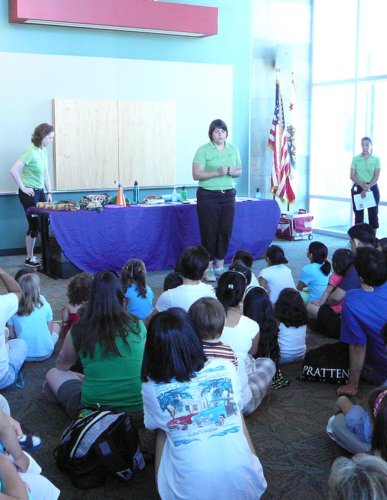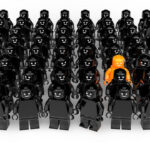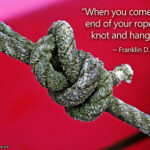You will never do anything in this world without courage. It is the greatest quality of the mind next to honor. – Aristotle

If you need to work on your courage when speaking in public, perhaps an audience of children would be a place to start. You might want to consider bringing a friend or two with you for support.
What does that mean?
While the word ‘anything’ is an absolute, and I try to avoid absolutes when I can, this is a case of dramatic license. Does breathing count as anything? Technically, yes it does. So let’s tone it down a bit, and change it to say that “You’ll never do anything of great significance without courage.”
With that reshaping of the quote, let’s dig in, shall we? Courage is the basis of the quote. The reshaped quote claims that only trivial things can be accomplished without courage. Think about that for a moment. With the possible exception of someone who doesn’t know how dangerous something is, it’s a fairly solid truth, isn’t it?
It takes courage to ask for a raise. It takes courage to ask for that first kiss. It takes courage to take a test. Pretty much any task or project that amounts to anything will take some courage to face. What takes courage for you might not take courage for someone else, but it will be trivial for them, right?
Why is countering fear with courage important?
There are little fears, and there are big fears. There are probably fears that rank between them, but for now, let’s consider the two extremes. The little fears are often things of which we are not even aware. Sometimes it may just be an uneasy feeling.
Other times, it’s BIG! Spiders are a common one, right? Most people know someone with a serious fear of spiders. But how does one face fears? How does one develop the courage to move forward despite fear, as you rarely will conquer fear in isolation, but in doing.
By facing our fears, by persevering despite fear, we display our courage. In this manner, we prove to ourselves that the fear is largely unfounded. Some fear injury or even death, but that fear recedes when they begin to understand how to manage the risk, and reduce it to practically nothing.
Where can I apply this in my life?
Through our actions, we become courageous. Think of all the times when you talked to yourself or with others about a fear, and decided that it was a silly thing of which to be afraid. But what happened when you were again faced with the fear? For most of us, the fear came back, right?
Yes, we have to think, talk, and investigate. We need to prove to ourselves that what we fear really won’t cause us harm. We need to be relatively certain of the safety of our body, our mind, our emotions, and our sense of well-being. Once we have that, the grip of fear is lessened.
But understanding is only part of the picture. Like the kids around the campfire saying to themselves that they aren’t afraid of ghosts, when the owl hoots loudly, what is going to happen? Taking action has been the best way I have seen fears cured.
That’s a great way to handle the bigger fears, and the lesser fears of which you are aware and have a desire to change. Break it down, try to figure what, exactly, causes the underlying fear, and start learning more about the subject.
If you were afraid of spiders, I wouldn’t recommend jumping into a ball pit full of tarantulas. However, once you determine what specifically scares you, the investigation can begin. Is it the look of them? Consider the beauty of their function. Is it the webs? Consider their beauty and efficiency at reducing bugs. Afraid of being poisoned? Find out which ones in your area are dangerous, as very few are, and rarely proactively attack humans.
The little fears, the barely detectable fears, to me they are the worst. They guide your life, but you rarely know. You feel uneasy or have a dislike of doing something. Have you ever considered why? When I have asked myself about such things, there is usually a small fear lurking just beneath the surface.
Why do you fear the dark? For me, it had to do with the number of times I had mangled my toes in the dark. Getting hurt is not something I enjoy, and I hurt myself most often by stumbling around in the dark. Once I had examined things, and realized what the main reason was, it became easier to face my fear.
In my case, I learned how to feel around, and to keep track of my surroundings when in familiar territory. In places where I wasn’t familiar, I clean or clear paths so I can move freely and safely. In places where these preparations don’t apply, I always have a flashlight with me. It’s easier to face the fear of darkness with a flashlight, right?
What makes you a little creeped out? Of what are you concerned and reluctant to do or be around? What is the reason for that unease? Dig deeper, and see if you can find an incident that left a mark on you. Perhaps something in your childhood, a vivid memory from a movie or a book?
What are your fears, and how will you face them? It might help to pick just one to start, and a small one at that. But if you don’t start, you won’t ever get over that fear. And facing fears is how you build courage. And courage is what you need to face the big challenges and do the great things.
From: Twitter, @DavidRoads
confirmed at : http://www.brainyquote.com/quotes/quotes/a/aristotle117889.html
Photo by San José Library







Pingback: allmixtips's Blog